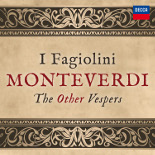Nicholas Mulroy (tenor)
Lucky us to be hearing, singing and playing Monteverdi in this, his 450th anniversary year. There will be of course be many performances of his three surviving operas (what wonders lie heartbreakingly lost to history we can only imagine…) and of course his 1610 Vespers. But, like every great composer, it’s fascinating and rewarding to look behind his best known monuments, which is what has been so memorable about this “Other Vespers” project. Just as Bach’s church cantatas or Schubert’s songs reveal work of imagination, humanity and insight to stand alongside anything else they wrote, so this lesser-known collection is a real treasure trove.  Hear all the aural splendour that we associate with these Venetian occasions, from those huge golden sonic canvases to intimately personal, even erotic solo-voice devotional motets.
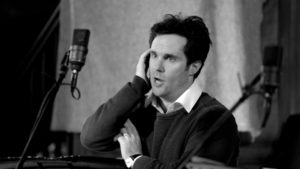 To be at the sessions when we recorded this was to attend something like the Champions League final for musicians of this repertoire – it’s very difficult to imagine a more accomplished, inspiring team, brought together under Robert’s inimitable leadership (he understands this music as well as anyone).
To be at the sessions when we recorded this was to attend something like the Champions League final for musicians of this repertoire – it’s very difficult to imagine a more accomplished, inspiring team, brought together under Robert’s inimitable leadership (he understands this music as well as anyone).
In short, if you think you know Monteverdi, buy this – it will give you new insights and more moments of wonder at his genius; if you don’t think you know him, buy this. You won’t regret it.
Greg Skidmore (baritone)
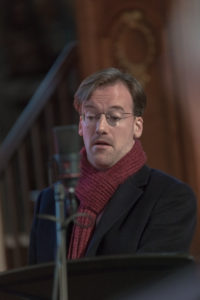 What a privilege to be involved in this fantastic recording project. Monteverdi is such an uncontrollable genius; his creativity explodes out of every piece he writes. He’s not alone, though, and it’s always exciting to encounter music written by his contemporaries that is every bit as muscular, joyous, powerful, and confident. At the other end of the spectrum, recording the Palestrina/Bovicelli divisions with Gawain was truly special. Going from total full throttle in the Gabrieli to such intimate, stylish and subtle music was a challenge, but a thrill. As a performance it feels vintage I Fagiolini and I’m honoured to be a part of it; vivid contrasts, exciting ranges of emotion and expressiveness, and challenging virtuosity.
What a privilege to be involved in this fantastic recording project. Monteverdi is such an uncontrollable genius; his creativity explodes out of every piece he writes. He’s not alone, though, and it’s always exciting to encounter music written by his contemporaries that is every bit as muscular, joyous, powerful, and confident. At the other end of the spectrum, recording the Palestrina/Bovicelli divisions with Gawain was truly special. Going from total full throttle in the Gabrieli to such intimate, stylish and subtle music was a challenge, but a thrill. As a performance it feels vintage I Fagiolini and I’m honoured to be a part of it; vivid contrasts, exciting ranges of emotion and expressiveness, and challenging virtuosity.
It was incredibly cold in Cambridge when we made this disc, I remember, but I think we were able to conjure up some Italian sunshine! Working with undergraduate singers, members of the University of York’s chamber choir, ‘The 24’, kept us all on our toes. More and more I’m finding it rewarding to feed off the energy and enthusiasm of these kids. They bring an innate understanding of what the music needs from all of us. I feel we all must constantly remember how much vitality is in this music, how much voltage, how much commitment. Being around younger people, who are so obviously desperately in love with it, makes this easier and more natural.
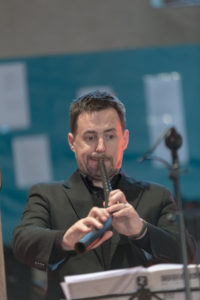 Gawain Glenton (cornetto)
Gawain Glenton (cornetto)
I Fagiolini have a nice line in whimsical CD titles, but don’t be fooled. This disc was always going to be serious work for all concerned, and for the cornetto players in particular. In Monteverdi’s day the cornetto used to do several jobs, including imitating as closely as possible the human voice, taking a violin-like role in instrumental music, or (when the time was right) to improvise and ornament with as much fantasy as could be mustered. This last job is nigh-on impossible without a supportive director, so it was great for Andrea Inghisciano and me that Robert really encouraged us. Some recording sessions can be a bit sterile, but believe me when I tell you that Andrea improvised completely different ornaments on every single take of track 1! The end result is a snapshot of an unrepeatable moment. You can come to hear us in concert (and please do!) but it will be different every time, and will never sound the same as the disc in your hand.
The Bovicelli diminutions I played in Ave verum are a different kettle of fish. Bovicelli was a virtuoso singer based in Milan who composed and published the ornaments I play. His aim was to teach ‘good taste’ and (just maybe…) to show everyone what a really great musician he was.
The virtuoso cornetto player Luigi Zenobi tells us that the soprano “has the obligation and complete freedom to improvise diminutions, to indulge in playfulness, and, in a word, to ornament a musical body. But unless this is done with art, with grace, and with good taste, it is annoying to hear, hard to digest, and loathsome to endure.†We tried to play with grace, but definitely went for ‘playfulness’ as well. We hope you like it.
Lynda Sayce (chitarrone, lute)
 Recording sessions are often workmanlike affairs, to a degree which might shock the uninitiated. What looks on paper like a generous schedule is often brutally tight once the realities of setting up, tuning, ‘noises off’ and necessary breaks are taken into account. The recording sessions for the ‘Other Vespers’ in November 2016 had all the hallmarks of hard work – a freezing Cambridge church, singers huddled over heaters longing for the next hot drink, instrumentalists torn between warm fingers or stable tuning as hired heaters were moved around…. And yet there was something about this recording which was unusually poignant and memorable for me. There were the familiar faces of some colleagues I had known since my student days – I was at Oxford with the founder members of I Fagiolini. I heard their first concerts… I shared lectures and exams with them… I was ‘in’ on the joke of the group name, and as a flute-playing history student who migrated late to the music faculty then swiftly followed this with an even more knee-jerk transition from flute to lute, I was making my own first forays into early music when I Fagiolini was being formed. It dawned on me during the sessions that those days were more than a generation ago. Robert’s elder daughter recently surfaced in the choir at the university where I now teach. His own student choir from York University sang in some tracks on the recording – and so a cycle of discovery is perpetuated.
Recording sessions are often workmanlike affairs, to a degree which might shock the uninitiated. What looks on paper like a generous schedule is often brutally tight once the realities of setting up, tuning, ‘noises off’ and necessary breaks are taken into account. The recording sessions for the ‘Other Vespers’ in November 2016 had all the hallmarks of hard work – a freezing Cambridge church, singers huddled over heaters longing for the next hot drink, instrumentalists torn between warm fingers or stable tuning as hired heaters were moved around…. And yet there was something about this recording which was unusually poignant and memorable for me. There were the familiar faces of some colleagues I had known since my student days – I was at Oxford with the founder members of I Fagiolini. I heard their first concerts… I shared lectures and exams with them… I was ‘in’ on the joke of the group name, and as a flute-playing history student who migrated late to the music faculty then swiftly followed this with an even more knee-jerk transition from flute to lute, I was making my own first forays into early music when I Fagiolini was being formed. It dawned on me during the sessions that those days were more than a generation ago. Robert’s elder daughter recently surfaced in the choir at the university where I now teach. His own student choir from York University sang in some tracks on the recording – and so a cycle of discovery is perpetuated.
As the recording will also celebrate the 450th anniversary of Monteverdi’s birth, the sessions also made me reflect on the tremendous impact this composer has had on my life. That sounds like an incredibly hackneyed cliché, I know, but for any 21st-century musician playing the formerly extinct dinosaur which is the theorbo, Monteverdi is the VIP who enables us to earn a living. My first attempt at continuo playing, as a self-taught undergraduate lutenist, was struggling through a student performance of ‘L’Incoronazione di Poppea’. My first theorbo was largely paid for by extended stints at ENO, awe-struck and beguiled by the late Anthony Rolfe-Johnson’s magnificent performances as Orfeo and Ulysses. I have performed Monteverdi’s iconic 1610 Vespers literally hundreds of times and recorded them twice. I have played on several I Fagiolini recordings devoted to Monteverdi, and am very much looking forward to the 2017 concerts of both the ‘Other Vespers’ and ‘Orfeo’. Exploring more music from this extraordinary man is always a joy; doing so with friends new and old is a rare privilege indeed. Monteverdi’s importance to me has been such that I have felt compelled, whenever I find myself in Venice, to visit the Frari and leave a rose on his tombstone. Appropriately enough, the most recent opportunity arose during an I Fagiolini tour where Matt Long delivered a searingly beautiful Orfeo. Mine was not the only rose on Monteverdi’s tombstone that day. It never is. Clearly I’m not alone in feeling a compunction to say a little thank you. Shivering in those November sessions in Cambridge, it felt entirely fitting to celebrate the great man’s 450th birthday in I Fagiolini’s company. We had swapped Oxford’s fog and Venice’s dazzling sunlight for fenland frost, but the music suffered not a whit.
httpv://youtu.be/IlvKrV13N9g
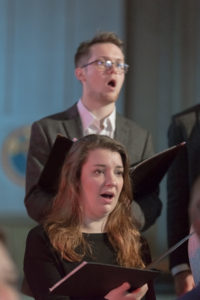
Rosie Parker, Sam Gilliatt
Rosie Parker (mezzo, The 24, University of York)
